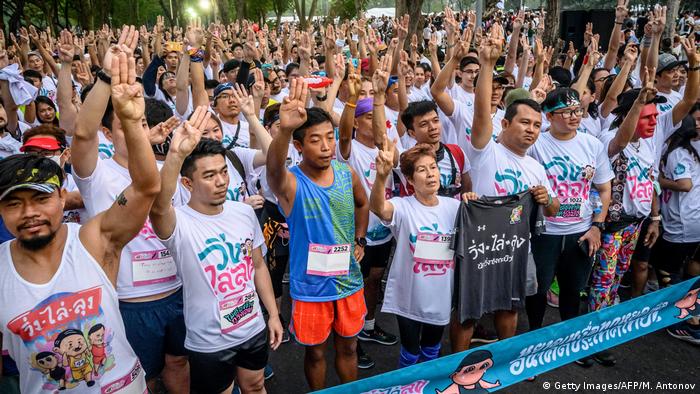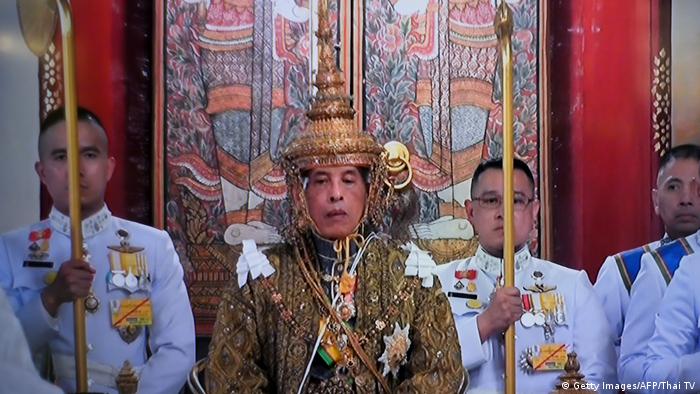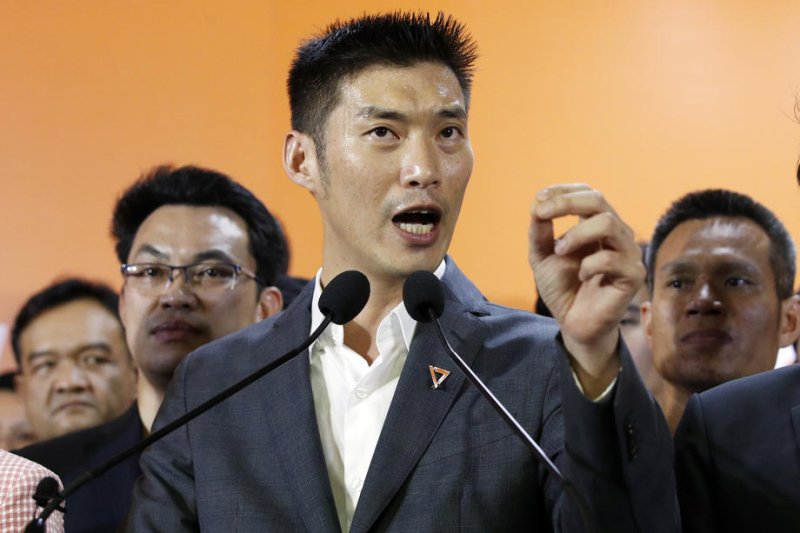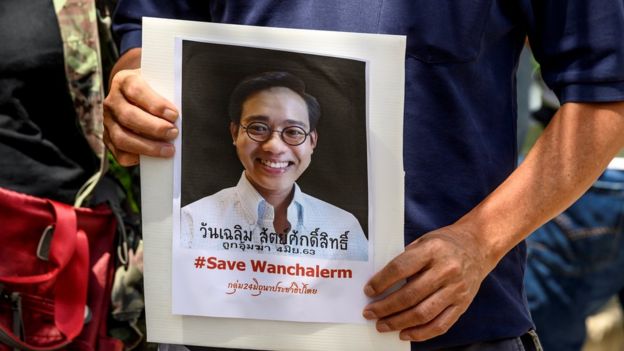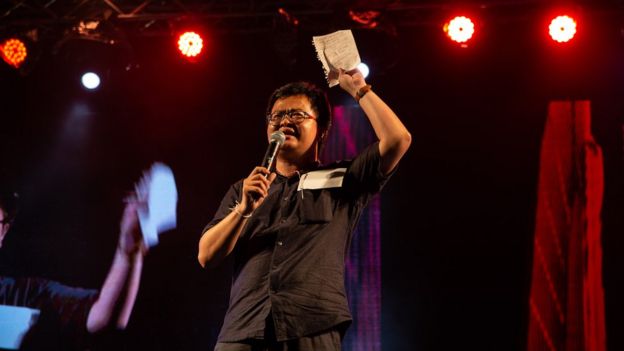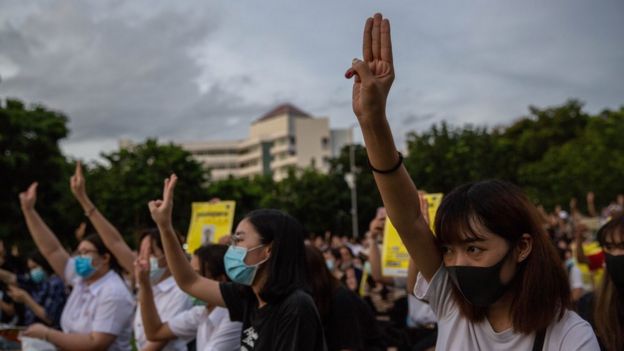In Thailand, student protesters take a leaf out of Harry Potter and Hunger Games books

At a recent rally on August 24 at Chiang Mai University, Thai student protesters raise three fingers in a show of resistance that pays tribute to the Hunger Games series.
THAILAND /
PROTESTS - 08/27/2020
Since mid-July, students in Thailand have taken to the streets in a pro-democracy movement that is the most powerful series of protests since the 2014 military coup. This generation is capitalising on their youthful energy and pop culture knowledge to use non-traditional forms of protests –including lifting dissent symbols from the Hunger Games series, staging Harry Potter-themed protests and holding open-mic nights calling for an end to military rule.
In almost daily protests, students in Thailand are calling for the establishment of a more democratic system in the country. Specifically, protesters are asking the government to disband parliament, reform the constitution and stop the harassment of activists. Thailand is a constitutional monarchy. Since the military coup in 2014,
a council of army leaders under Prime Minister Prayuth Chan-ocha has held power. The prime minister is a former army chief. Protestors say that the close relationship between the monarchy and the military are
a threat to democracy in Thailand.
Older generations have often resisted openly criticising the nation’s monarchy –
Article 112 of Thailand's criminal code declares that any citizen who "defames, insults or threatens the king, the queen, the heir-apparent or the regent" can receive up to a 15-year prison sentence. But this younger generation is fighting back, using all the tools of social media at their disposal. Across social media platforms, students are organising under the hashtag #เยาวชนปลดแอก (#YouthsLiberation).
Harry Potter and the Hunger Games
One of the students' most commonly shared symbols of resistance is a three-fingered salute. This is borrowed from the Hunger Games young adult books. In the dystopian series, the heroine, Katniss Everdeen, uses this salute as a call for revolution against the oppressive rule of the president. Thai youth first started
invoking this symbol in 2014 right after the military coup, and it has been resurrected this year.

อยากถามว่า ครูอายไหม ??
เป็นกู กูอายนะ .. ????
สีกากี หากแปลตรงตัว คือขี้ข้าราษฏร์ ..
#โรงเรียนหน้าเขาไม่เอาเผด็จการ#เยาวชนปลดแอก #ขีดเส้นตายไล่เผด็จการ pic.twitter.com/soQuJFe7w1 B A N K K E R (@BANKIVXCII)
August 17, 2020In this video, shared on August 25, a teacher tries to take a paper away from students speaking on stage. In response, the students raise three fingers and the crowd erupts in cheers.
On Monday, August 24, many students at Chiang Mai University joined an evening of speeches, rap, singing and protest. Thousands of students, as well as other citizens, gathered at the Ang Kaew Pavilion to speak out (and sing) against Prime Minister Prayuth Chan-ocha and King Maha Vajiralongkorn.
 #เยาวชนปลดแอก #ประชาชนปลดแอก #ขีดเส้นตายขับไล่เผด็จการ #ประยุทธ์ออกไป #ประเทศที่บอกเสรีแต่ไม่มีสิทธิ์เลือก#ไม่เอาเรือดำน้ำ#ไม่เอารัฐประหาร #รัฐบาลส้นตีนคนเชียร์ก็ส้นตีน#รัฐบาลเฮงซวย#เผด็จการจงพินาศประชาธิปไตยจงเจริญ #เผด็จการจงพินาศประชาธิปไตยจงเจริญ
#เยาวชนปลดแอก #ประชาชนปลดแอก #ขีดเส้นตายขับไล่เผด็จการ #ประยุทธ์ออกไป #ประเทศที่บอกเสรีแต่ไม่มีสิทธิ์เลือก#ไม่เอาเรือดำน้ำ#ไม่เอารัฐประหาร #รัฐบาลส้นตีนคนเชียร์ก็ส้นตีน#รัฐบาลเฮงซวย#เผด็จการจงพินาศประชาธิปไตยจงเจริญ #เผด็จการจงพินาศประชาธิปไตยจงเจริญCr. Goodmondayshoot
pic.twitter.com/Vm6wnUJleA Leader Democracy (@LeaderDemocracy)
August 25, 2020In this photo, taken at a rally on August 24, the speaker raises her hand in a three-fingered salute. The crowd responds. Photo taken by Instagram user
GoodMondayShoot and reshared.
During one popular rally on August 3, students dressed up as Harry Potter characters and met at the Democracy Monument in Bangkok. The protesters waved chopsticks serving as wands into the air as they called for the end of military leadership in the country. Leaders at the protest
claimed that the Harry Potter theme referenced their call to decrease the military’s influence in government and to strengthen peoples’ civil rights and liberties.
ร่วมกันเสกคาถาผู้พิทักษ์ ‘เอ็กซ์เป็กโตร พาโตรนุม’ ใส่ผู้คุมวิญญาณที่คอยดูดกลืนความสุข เจ๋งงงงงง
#เสกคาถาไล่คนที่คุณก็รู้ว่าใคร #เยาวชนปลดแอก pic.twitter.com/hIpHC2zhy0 คุณพี่อยู่จังหวัดอะไรค๊าาา (@cnew888)
August 3, 2020A student wearing a Hogwarts robe from the House of Slytherin speaks at a recent rally on August 3. The caption reads, “Together, cast a guardian spell. 'Expectro Patronum' to put on the dementors who absorb the delight.”
18.50 น. มายด์ นศ. ม.มหานคร ผู้ปราศรัยคนที่3 กล่าวถึงข้อเรียกร้อง3ข้อของ
#เยาวชนปลดแอก กล่าวว่าการยุบสภาจะเกิดขึ้นได้เราต้องเอาสว.ออกไปจากระบบการเมือง พร้อมเชิญชวนผู้เข้าร่วมตะโกน 3 ครั้งว่า “เราจะไม่หยุดจนกว่าอำนาจมืดจะหมดไป”
#เสกคาถาไล่คนที่คุณก็รู้ว่าใคร pic.twitter.com/n3egwlOz5B TLHR / ศูนย์ทนายความเพื่อสิทธิมนุษยชน (@TLHR2014)
August 3, 2020These photos from the same protest show a student speaker in a Hogwarts robe. The caption explains that she listed the demands of the #YouthsLiberation movement and told the audience to chant three times,"We will not stop until the dark power is over".
Resistance in schools
Besides calling for a true democratic system, students are also protesting the strict regulations imposed on youth in Thailand. In schools, students are required to sing a song that praises the 12 Thai values – notably discipline and filial piety. There are also
mandatory haircuts, which is a rule dating back to when Thailand was run by a United States-supported military field marshal.
Since the protests started, though, many students are refusing to sing this Thai anthem, instead lifting their hands in the three-fingered salute. Some schools have tried to
ban the salute. In the past week over 100 students have reported being harassed after either wearing white bows or making the three-fingered salute in protest, according to the group
Thai Lawyers for Human Rights.โรงเรียนเราร่วมกันชู3นิ้ว หลังทำเสร็จครูก็ได้มีการออกมาพูดว่า มันไม่สมควรทำในรร.มีกฎ มีกรอบ แล้วได้มีการถามว่าอยากจะมีใครออกมาพูดไหม ตามในคริปเลยค่ะ พี่นางฟ้าของเรา
#โรงเรียนหน้าเขาไม่เอาเผด็จการ pic.twitter.com/vOuGrgPsWY Clz (@__chxrlie)
August 17, 2020In this video, shared on Twitter on August 17, a student explains that a teacher admonished students for this symbol of resistance. The caption says: “Our school raised 3 fingers. After this was done, the teacher came out and said this should not be done in the school...”
ชอบรูปนี้มาก เอเนอจี้แบบพวกหล่อนไม่ให้ชั้นผูกโบว์ขาวไปโรงเรียนใช่มั้ย ได้! ชั้นเอาไปผูกหน้ารั้วกระทรวงศึกษาธิการแม่งเลยค่ะ ลูกศิษย์มิสซิสสร พวกเธอทำดีมาก
#เลิกเรียนไปกระทรวง #เยาวชนปลดแอก #WhatHappensinThailand pic.twitter.com/xv37DuVKWk คุณนง (@yournosyfriend)
August 19, 2020In this photo, shared on August 19, students tie white bows on the fence of the Minister of Education.
Government crackdown
The arrests of prominent youth protest leaders has been widely documented and shared on social media. The
arrest of Panupong “Mike Rayong” Jadnok prompted a strong backlash. Jadnok was arrested with five others who had all participated in an earlier protest, named Free Youth, at Thammasat University Rangsit campus on August 10. According to the warrant, Jadnok is accused of sedition, violating the law against assembly due to Covid-19, and unauthorised use of loudspeakers.
In this Facebook live video, shared Monday August 24, activist Panupong “Mike Rayong” Jadnok is arrested by the police.
This powerful series of youth protests is technically considered illegal due to Thailand’s restrictions on assembly due to the Covid-19 pandemic. But the movement shows no signs of slowing.
The Thai government recently took steps to try to restrict the protesters' influence on social media. On Monday, August 24,
the government ordered Facebook to partially restrict access to one group on the platform that opposes the monarchy. There are over a million members in the group, which was created by a Thai academic who lives in Japan. Although Facebook complied, denying users in Thailand access to the group, Facebook said in a
statement that it will take legal action against the Thai goverment.
Elsewhere on social media in Thailand, the hashtag continues to trend – and the rallies continue.
This article was written by
Sophie Stuber





